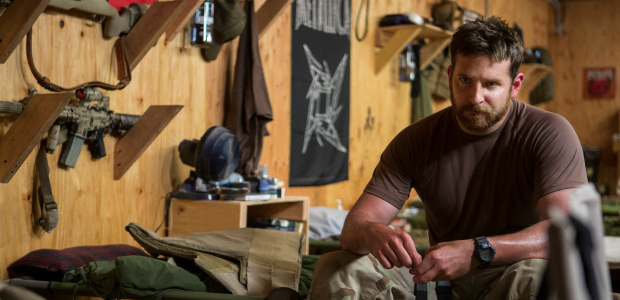A proud and dedicated member of the United States Navy SEALs program, Chris Kyle is known as the Navy’s most lethal sniper, having notched 160 confirmed kills over the course of four combat tours in the Iraq War. He’s extremely decorated for his service, having received two Silver Star Medals, five Bronze Star Medals, one Navy and Marine Corps Commendation Medal, and two Navy and Marine Corps Achievement Medals. And even if you don’t know the somber and touching outcome of Kyle’s ultimately tragic story, there’s no question that his life’s mission – and the best-selling novel he penned – needed to be portrayed on the big screen for all to see.
American Sniper, Clint Eastwood’s harrowing biopic of expert marksman Chris Kyle, services the man’s legend but shortchanges the family he frequently left home so he could protect his brothers in arms. The movie is pro-military but anti-war, and it does an outstanding job portraying the contradictions of military service, and the strains that a commitment to the military can have on the individual, his immediate family, his colleagues, and total strangers who simply are moved by the patriotic decision to serve our country. There’s no question American Sniper is Clint Eastwood’s best film in years – though it should be noted that we can claim this because recent films like Jersey Boys, J. Edgar, Hereafter, Invictus and Gran Torino have been mediocre disappointments.
Bradley Cooper’s nearly unrecognizable on multiple levels as Chris Kyle, bulking up and basically swallowing his natural charisma to play a bear of a man who Eastwood immediately establishes as a protector, a blunt force programmed to stand up to wrongdoings. It takes the normally verbose Philadelphian some time to find the right delivery for Kyle’s Texas drawl, and in early scenes where Chris either romances the pretty Taya Renae Kyle (Sienna Miller) or discovers his calling in the military, lines of dialogue actually are garbled by bad delivery.
Truthfully, the first act of American Sniper almost tanks as Eastwood, Cooper and Miller rush through self-appointed “important” moments from Kyle’s timeline without establishing a real flow. There’s a troubling speed with which Eastwood ticks off the prestige-biopic visuals like he’s playing Awards-Bait Bingo. (His daddy takes him hunting! He enlists! He marries! He heads overseas!) Eastwood isn’t a subtle director – I’m not sure if he ever was, but his recent output notably lacks the delicate touch his material requires – and his usual obstacles hinder the opening 30 minutes of Sniper. It’s melodramatic. It’s a little sloppy. At one point, I made note that American Sniper lacked a sharp precision, which was ironic because “precision” was the calling card of the film’s subject matter.
Then, something changes. The storytelling improves. Cooper figures out how best to portray Kyle, treating him not as a larger-than-life war hero, but as a compassionate “older sibling” figure to the often-terrified soldiers he’s tasked with protecting from the eagles-nest perch of a sniper’s tower. The men feel safer knowing Kyle’s watching over them, like a silent Guardian Angel – and it helps us better understand Kyle’s magnetic pull back to the battlefield when he’s safely home with his wife and kid, but restless. Eastwood even establishes a rival to Kyle in The Butcher (Mido Hamada). The movie kicks into a different gear when it has real focus, when Kyle has an actual mission, and Eastwood has a message he can finally button down on and deliver to the audience.
Eastwood might be at his best when he’s on the battlefield. American Sniper often calls to mind the director’s similarly compelling, and often terrifying, Letters from Iwo Jima which plunged patrons into jarring combat sequences. And like Eastwood’s two-film reflection on that iconic World War II skirmish, American Sniper seems to endure its war-time sequences so it can go on to make a more-relevant and interesting comment about the effect war has on men and women when they return home. Again, this is handled with Eastwood’s now-signature lack of grace and finesse. But Cooper’s portrayal of the American hero is compelling enough to overcome Eastwood’s faults.
Chris Kyle’s story deserved to be told. And the longer you wear American Sniper, the better it fits. Eastwood doesn’t flinch from the horrifying acts of war that took place during the Iraq War. But the movie shortchanges Kyle’s blood relatives in favor of the “family” he fought and died for in the military.

Sean O’Connell is a journalist and CinemaBlend’s Managing Editor. Having been with the site since 2011, Sean interviewed myriad directors, actors and producers, and created ReelBlend, which he proudly cohosts with Jake Hamilton and Kevin McCarthy. And he's the author of RELEASE THE SNYDER CUT, the Spider-Man history book WITH GREAT POWER, and an upcoming book about Bruce Willis.











